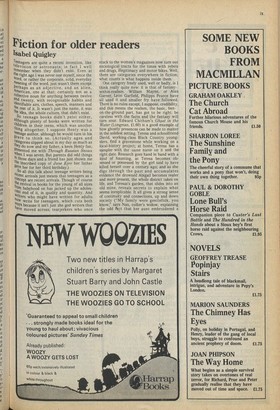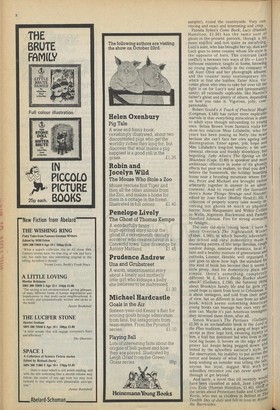Fiction for older readers
Isabel Quigley
Teenagers are quite a recent invention, like television or astronauts; in fact I well remember when they didn't exist. Even at the right age I was never one myself, since the Word, or rather the corporate, solid, everyday Meaning of the word, just wasn't there except Perhaps as an adjective, and an alien, American, one at that: certainly not as a collective noun for anything between twelve and twenty, with recognisable habits and identifiable airs, clothes, speech, manners and the rest of it. It wasn't just the name, it was the idea, the whole culture, that didn't exist. So teenage books didn't exist either, although plenty of books were written for children in their teens, which was another thing altogether. I suppose Henty was a teenage author, although he would turn in his grave to think so. (Actually ages and categories slipped about in my day as much as theY do now and my father, a keen Henty fan, Presented me with Through Russian Snows !'hen I was seven. But parents did odd things those days and a friend has just shown me the inscribed copy of Jane Eyre her father gave her for her third birthday.) So all this talk about teenage writers being recent arrivals just means that teenagers as a ncePt are recent arrivals. Though of course cgle revival in books for the young of all sizes rciin babyhood on has jacked up the adolescent end of it, in quality and quantity. And Writers who might have written for adults nOW write' for teenagers, which cuts both ‘FivaYs because it isn't just zhe god writers that ave moved across; tearjerkers who once stuck to the women's magazines now turn out sociological tracts for the times with rebels and drugs, illegitimacy and motor bikes. Well, there are categories everywhere in fiction; what counts is what happens inside them.
One category freely used, well or badly, is I think really quite new: it is that of fantasywithin-realism. William Mayne, or Alan Garner, Leon Garfield, Philipps Pearce have all used it and smaller fry have followed. There is no rules except, I suppose, credibility, and this means the realism, the basic, feeton-the-ground part, has got to be right: be careless with the facts and the fantasy will turn sour. Edward Chitham's Ghost in the Water (Longman, £1.60) is a good example of how ghostly presences can be made to matter in the solidest setting. Teresa and schoolfriend David, working-class Black Country youngsters, find a gravestone while working on a local-history project; at home, Teresa has a sampler with the 'same name on it and the right date. Research goes hand in hand with a kind of haunting, as Teresa becomes obsessed or possessed by the girl said t9 have killed herselt over a century ago; and as she digs through the past and accumulates evidence the drowned Abigail becomes realer and more present, the whole district takes on life, and Teresas's garden, that slides into an old mine, reveals secrets to explain what seems inexplicable. It all gives a strong sense of continuity and connections, up and down society ("My family were gentlefolk, you know," says Nan, collier's widow, explaining the odd fast that her aunt embroidered a
sampler), round the countryside. Very convincing and exact and interesting and crisp.
Pamela Sykes's Come Back, Lucy (Hamish Hamilton, £1.50) has the same sort of ghost-in-the-present pattern, though a bit more explicit and not quite as satisfying. Lucy's aunt, who has brought her up, dies and Lucy goes to some cousins whose life-style IS the opposite of hers. The contrast (and conflict) is between two ways of life — Lucy's hothouse existence, taught at home, knowing no young people, wholly in the company of old Aunt Olive and her photograph albums; and the cousins' noisy contemporary life, which at first she loathes. Enter Alice, Vic
torian ghost who tries to take her over till the fight is on for Lucy's soul and (presumably) sanity; all rationally explicable, like Hamlet's
father's ghost and plenty of others, depending on how you take it. Vigorous, jolly, cornpanionable. Robert Gould's A Touch of Practical Magic (Longman, £.140) has rather more explicable
marvels in that everything miraculous is plain to adult eyes though astounding to young ones. Selina Brown from Jamaica visits her
show-biz relation Miss Lillabelle, who for years has been posing as Nelly the maid because she can't face her own ageing and disintegration. Enter agent, job, hope and
Miss Lillabelle's long-lost beauty; a bit sew timental, obvious and frankly showbizzy, but
beguiling. Judy Allen's The Spring on the Mountain (Cape, £1.60) is spookier and more ambitious; effective in some of its ghostlY
effects but poor on realism, so that you don't
believe the framework, the holiday boarding house near a brooding mountain where Em
ma, Peter and Michael are brought rather
arbitrarily together in answer to an advertisement. And to round off the fantasies there's Some Things Strange and Sinister, edited by Joan Kahn (Bodley Head,£1.35). a collection of properly scarey tales mostly in; volving not ghosts so much as physics, horror; from Maupassant and Wilkie Collins to Wells, Algernon Blackwood and Pamela Hansford Johnson. Fine'for strong stomachs by firelight. The only old-style 'young book' I have is Jenny Overton's The Nightwatch Winter (Faber, £.160), in which homely adventure, day school and rural domesticity made a, reassuring pattern of life: large families, tough outdoor doings, amateur dramatics, local }If; fairs and a healthy mixture of generations an, outlooks. Literate, likeable, well organised. it just goes to show how high the standard for this kind of book has become that it seeMS
little prosy. And for domesticity plain an," simple, there's something completelY
different: M. E. Kerr's Dinky Hocker shoots smack! (Gollancz, £.150), the funniest thing about Brooklyn family life and fat girls Yofti, could hope to meet from here to Crhsitmas. is about teenagers, and told from their pop); of view, but no different in tone from an aduh book, which seems something Amerienia young books can manage but ours very se': dom can. Maybe it's just American teenagers' they invented them there, after all. Simon Watson's The Partisan (Gollanz,‘ £1,50) is an unclassfiable book in the Lord 01 the Flies tradition, about a gang of boys W11°0 accept as their liege lord, swearing loyaltY him, a frail but dominant lad who lives in tn'i local big house. It hovers on the edge of reaA power but keeps, being pegged down
lmited by the schoolboy narrator's style, Ill: flat observation, his inability to put across to„` terror and beauty of what happens; so Yo''
keep wishing an outsider was telling the tale.: anyone but loyal, dogged Will with hi:
schoolboy reticence you can never quite se' through or get beyond. Id
And And lastly, a novel that till recently WO ,5 have been classified as adult, Joan Lingard.. Into Exile (Hamish Hamilton, £1.40), thira...lh_ the series about Protestant Sadie and Cathol,lc_ Kevin, who met as children in Belfast in Inn's Twelfth Day of July and fell in love in Acors the Barricades.



































































 Previous page
Previous page